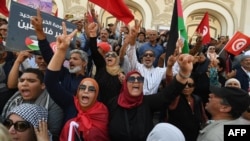Tunisian authorities on Sunday ordered the arrest of two journalists over critical comments, a lawyer told AFP, a day after security forces stormed the bar association and took political commentator Sonia Dahmani into custody.
Dahmani, also a lawyer, was arrested late Saturday after criticizing the state of Tunisia on television, her attorney Dalila Msaddek said in a post on Facebook.
Msaddek said there was a "police attack against the bar association headquarters" in Tunis, with "lawyers assaulted and the abduction of colleague Sonia Dahmani to an unknown location."
It came on the same evening that TV and radio presenter Borhen Bssais and political commentator Mourad Zeghidi were arrested for critical comments, lawyer Ghazi Mrabet told AFP.
Mrabet said that the judiciary on Sunday placed the pair under a "48-hour detention warrant and [they] will have to appear before an examining magistrate."
According to Mrabet, Zeghidi was being pursued "for a social media post in which he supported an arrested journalist," referring to Mohamed Boughalleb, who was sentenced to six months in prison for defamation of a public official, as well as for "statements made during television shows since February."
Zeghidi is a commentator on Tunisian television and works with Bssais, who hosts programs on private radio and TV channels.
The exact motivation for Bssais's arrest remains unclear, but according to Mrabet, he was detained under Decree 54 which punishes the production and dissemination of "false news."
The law, signed by President Kais Saied in September 2022, has been criticized by journalists and opposition figures who say it has been used to stifle dissent.
Since the decree came into force, more than 60 journalists, lawyers and opposition figures have been prosecuted under it, according to the National Union of Tunisian Journalists.
Dahmani was also arrested under Article 54, Tunisian media reported, saying she was detained while seeking safety at the bar association.
The event was being filmed live by news channel France 24, which said it was forced to stop broadcasting by masked police officers.
The channel denounced the police officers in a statement, saying they had "torn the camera from its tripod" and briefly detained their cameraman.
It condemned what it said was a "brutal intervention by security forces that prevented journalists from practicing their profession as they were covering a lawyers' protest for justice and in support of freedom of expression."
The bar association condemned what it described as an "invasion of its headquarters and blatant aggression" in front of the press, demanding the immediate release of Dahmani and announcing a regional strike starting Monday.
'Extraordinary country?'
Msaddek said Dahmani was summoned to court on Friday to explain her remarks but refused to appear. A court then issued a warrant ordering law enforcement to bring Dahmani before the investigating judge.
Islam Hamza, another lawyer in Dahmani's defense team, confirmed to AFP that she had been arrested.
Dahmani told journalists before her arrest that she refused to appear "without knowing the reasons for this summons."
During a show on the Carthage Plus TV channel on Tuesday, she responded to another pundit's claim that migrants from sub-Saharan African countries were seeking to settle in Tunisia.
"What extraordinary country are we talking about?" she asked sarcastically, triggering angry reactions from some Tunisian social media users.
The North African country is a key departure point for thousands of migrants who risk perilous Mediterranean Sea crossings each year hoping for a better life in Europe.
But the situation of sub-Saharan African migrants in Tunisia has worsened, particularly after a speech by Saied last year in which he painted "hordes of illegal migrants" as a demographic threat.
Decree 54 mandates up to five years in prison for the use of communications networks to "produce, spread [or] disseminate ... false news" or to "slander others, tarnish their reputation, financially or morally harm them."













